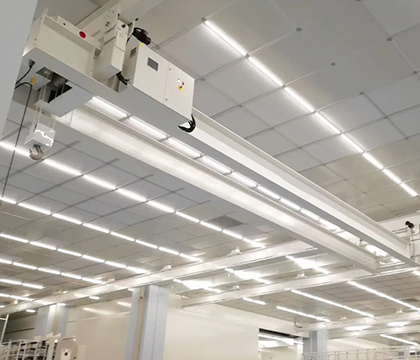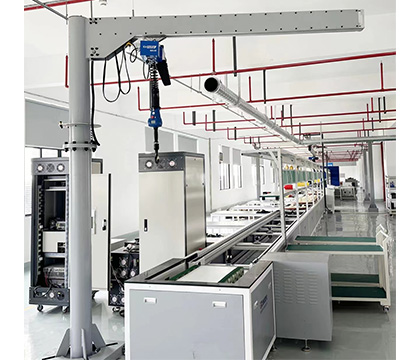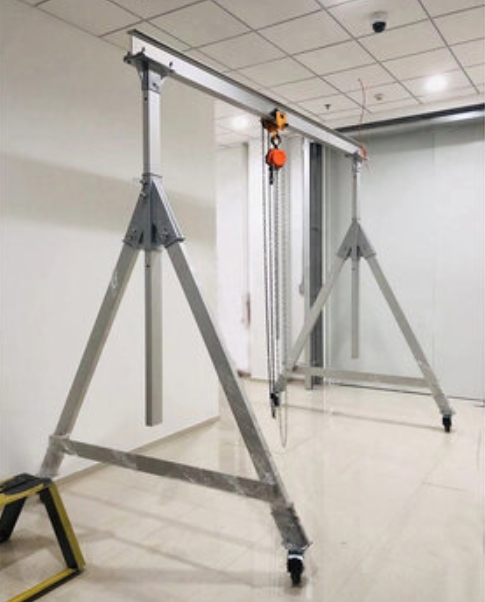In the pharmaceutical industry, cleanroom environments are essential for ensuring product safety and quality. Custom lifting equipment plays a vital role in maintaining these standards while enhancing efficiency in production procedures. This article explores these different types of cleanroom cranes and their applications in the pharmaceutical industry.
Overhead Lifting Equipment
Overhead cranes, also known as bridge cranes, are a common choice for cleanroom environments. These cranes consist of a horizontal beam that spans the length of the work area, supported by two end trucks that run on elevated tracks. This configuration allows for the efficient movement of materials across large areas with minimal interference to the cleanroom environment.
Advantages:
• Space Efficiency: Overhead cranes maximize floor space by utilizing overhead space, which is particularly valuable in cleanrooms where floor space is often at a premium.
• Load Capacity: They can handle a wide range of load capacities, making them suitable for various pharmaceutical production needs.
• Cleanroom Compliance: Bridge cranes can be customized with smooth, non-porous surfaces and sealed components to prevent contamination.
Applications: Ideal for moving large containers, equipment, and bulk materials within the cleanroom. They are commonly used for transferring ingredients, packaging materials, and finished products.

Jib Cranes
Jib cranes are characterized by their freestanding or wall-mounted structures with a horizontal arm (jib) that extends out from a central pillar or base. The hoist or trolley travels along the jib, providing lifting capabilities within a defined radius.
Advantages:
• Precision: Jib cranes offer precise control over the placement of materials, which is crucial for delicate handling in a cleanroom.
• Compact Design: Their design allows them to fit into tight spaces, making them ideal for small to medium-sized cleanrooms or production cells.
Applications: They are commonly used for tasks that require localized lifting, such as moving smaller containers or equipment to and from workstations or cleanroom benches.

Mobile Gantry Cranes
Mobile gantry cranes are versatile lifting systems mounted on wheels or casters, allowing them to be moved around the cleanroom. They consist of a gantry structure with a hoist that can be adjusted along the length of the beams.
Advantages:
• Mobility: Their ability to move and reposition makes them ideal for cleanrooms with varying needs or layouts.
• Adjustability: Height and span can often be adjusted to accommodate different lifting requirements and spaces.
Applications: Mobile gantry cranes are useful for handling equipment or materials that need to be frequently moved between different areas of the cleanroom. They are also beneficial in facilities with changing production lines or temporary setups.

Choosing the Right Cleanroom Lifting Equipment
Selecting the appropriate lifting equipment for a pharma cleanroom involves considering several factors:
1. Cleanroom Standards: Ensure that the crane meets specific cleanroom cleanliness grade, focusing on the materials that do not shed particles and special designs for cleanroom operation.
2. Load Requirements: Evaluate the weight and type of materials to be lifted to determine the necessary load capacity and lifting height.
3. Space Constraints: Consider the layout and space constraints of the cleanroom to choose equipment that optimizes the available area.
4. Workflow Integration: Select equipment that integrates seamlessly with existing workflows and production processes.
In conclusion, custom lifting equipment like overhead cranes, jib cranes, and mobile gantry cranes play a vital role in ensuring efficient and contamination-free operations in pharmaceutical cleanrooms. By carefully selecting and customizing these systems, pharmaceutical manufacturers can enhance productivity while maintaining the strict cleanliness standards required for their operations.
Clean Room Crane System for Food Production